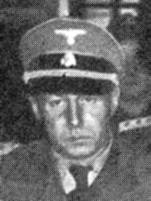), NSDAP and SS member, and former German navy officer,
was responsible for construction and delivery of gas vans, within the RSHA (
).
, he became chief of the department for technical affairs (section II D) of the RSHA.
he managed the delivery of approximately 20 gas vans.
Berlin, Prinz-Albrecht-Str. 8
 |
| Walther Rauff |
The overhauling of vans by groups D and C is finished. While the vans of the first series can
also be put into action if the weather is not too bad, the vans of the second series (
Saurer)
stop completely in rainy weather. If it has rained for instance for only one half hour, the van
cannot be used because it simply skids away. It can only be used in absolutely dry weather.
It is only a question now whether the van can only be used standing at the place of execution.
First the van has to be brought to that place, which is possible only in good weather. The place
of execution is usually l0-15 km away from the highways and is difficult to access because of its
location; in damp or wet weather it is not accessible at all. If the persons to be executed are
driven or led to that place, then they realize immediately what is going on and get restless,
which is to be avoided as far as possible. There is only one way left; to load them at the
collecting point and to drive them to the spot.
I ordered the vans of group D to be camouflaged as house-trailers by putting one set of window
shutters on each side of the small van and two on each side of the larger vans, such as one
often sees on farm-houses in the country. The vans became so well-known, that not only the
authorities, but also the civilian population called the van "death van", as soon as one of these
vehicles appeared. It is my opinion, the van cannot be kept secret for any length of time, not
even camouflaged.
The
Saurer-van, which I transported from
Simferopol to
Taganrog, suffered damage to the brakes on
the way. The Security Command [SK] in
Mariupol found the cuff of the combined
oil-air brake broken at several points. By persuading and bribing the H.K.P. (?) we managed to have a form machined,
on which the cuffs were cast. When I came to
Stalino and
Gorlowka a few days later, the drivers of
the vans complained about the same faults. After having talked to the commandants of those commands
I went once more to
Mariupol to have some more cuffs made for those cars too.
As agreed two cuffs will be made for each car, six cuffs will stay in
Mariupol
as replacements for group D and six cuffs will be sent to
SS-Untersturmfuehrer Ernst in
Kiev for the cars of group C. The cuffs for the groups
B and A could be made available from
Berlin, because transport from
Mariupol to the north would be too complicated and would take too long.
Smaller damages on the cars will be repaired by experts of the commands, that is of the groups in their own shops.
Because of the rough terrain and the indescribable road and highway conditions the caulkings and
rivets loosen in the course of time. I was asked if in such cases the vans should be brought to
Berlin for repair. Transportation to
Berlin
would be much too expensive and would demand too much fuel.
In order to save those expenses I ordered them to have smaller leaks soldered and if that should
no longer be possible, to notify
Berlin immediately by radio, that Pol. Nr... is
out of order.
Besides that I ordered that during application of gas all the men were to be kept as far away from
the vans as possible, so they should not suffer damage to their health by the gas which eventually
would escape. I should like to take this opportunity to bring the following to your attention: several
commands have had the unloading after the application of gas done by their own men. I brought to
the attention of the commanders of those S. K. concerned the immense psychological injuries and
damages to their health which that work can have for those men, even if not immediately, at least
later on. The men complained to me about headaches which appeared after each unloading. Nevertheless
they don't want to change the orders, because they are afraid prisoners called for that work, could use
an opportune moment to flee. To protect the men from these damages, I request orders be issued accordingly.
The application of gas usually is not undertaken correctly. In order to come to an end as fast as
possible, the driver presses the accelerator to the fullest extent. By doing that the persons to be
executed suffer death from suffocation and not death by dozing off as was planned. My directions now
have proved that by correct adjustment of the levers death comes faster and the prisoners fall asleep
peacefully. Distorted faces and excretions, such as could be seen before, are no longer noticed.
Today I shall coritinue my journey to group B, where I can be reached with further news.
Signed: Dr. Becker
SS-Untersturmfuehrer
Source: http://www.ess.uwe.ac.uk
© ARC 2005







